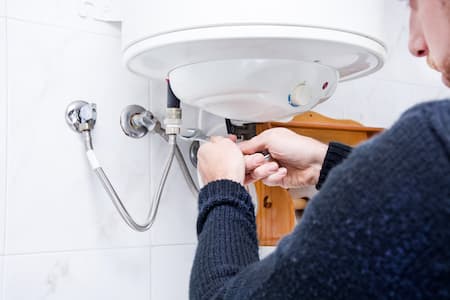The Usual Heater Complications
The Usual Heater Complications
Blog Article
How do you really feel in regards to Common Problems with Tank Water Heaters?

Picture beginning your day without your routine warm shower. That already establishes a poor tone for the rest of your day.
Every home needs a dependable hot water heater, however just a couple of know just how to manage one. One simple way to keep your hot water heater in leading shape is to check for mistakes frequently and also fix them as soon as they show up.
Keep in mind to switch off your hot water heater before smelling around for mistakes. These are the water heater faults you are probably to run into.
Water too hot or too cold
Every hot water heater has a thermostat that determines exactly how warm the water gets. If the water entering into your house is also hot in spite of setting a practical maximum temperature, your thermostat might be faulty.
On the other hand, too cold water might be because of a failed thermostat, a broken circuit, or inappropriate gas circulation. For instance, if you use a gas hot water heater with a damaged pilot light, you would certainly obtain cold water, even if the thermostat is in excellent condition. For electrical heating units, a blown fuse might be the perpetrator.
Insufficient warm water
Water heaters come in lots of dimensions, depending on your warm water needs. If you run out of warm water prior to everybody has had a bath, your hot water heater is too little for your family size. You need to consider setting up a bigger hot water heater container or selecting a tankless hot water heater, which uses up less area and also is more durable.
Strange noises
There go to the very least 5 type of sounds you can speak with a hot water heater, yet one of the most usual analysis is that it's time for the water heater to retire.
First off, you need to know with the typical sounds a hot water heater makes. An electrical heating unit may appear different from a gas-powered one.
Standing out or banging noises usually suggest there is a piece of debris in your tanks, and also it's time to clean it out. On the other hand, whistling or hissing audios may simply be your valves allowing some pressure off.
Water leakages
Leaks can come from pipelines, water links, valves, or in the worst-case circumstance, the tank itself. Over time, water will certainly corrode the container, and discover its way out. If this occurs, you need to replace your hot water heater asap.
Nevertheless, prior to your modification your entire container, be sure that all pipes are in location which each valve works flawlessly. If you still require help identifying a leak, call your plumber.
Rust-colored water
Rust-colored water indicates among your hot water heater components is worn away. It could be the anode pole, or the tank itself. Your plumber will certainly be able to identify which it is.
Lukewarm water
Despite just how high you set the thermostat, you won't get any type of hot water out of a heater well past its prime. A hot water heater's performance might minimize with time.
You will certainly likewise obtain lukewarm water if your pipes have a cross link. This implies that when you activate a tap, warm water from the heating system flows in together with regular, cold water. A cross link is very easy to area. If your warm water faucets still pursue shutting the water heater valves, you have a cross link.
Discoloured Water
Corrosion is a major source of unclean or discoloured water. Corrosion within the water container or a falling short anode rod could trigger this discolouration. The anode pole secures the container from rusting on the within and need to be examined annual. Without a pole or an effectively working anode rod, the warm water quickly corrodes inside the tank. Get in touch with a professional hot water heater specialist to determine if changing the anode pole will repair the problem; otherwise, change your water heater.
Conclusion
Ideally, your water heater can last ten years before you require an adjustment. However, after the 10-year mark, you might experience any one of these mistakes more consistently. At this moment, you should add a brand-new water heater to your budget plan.
How To Troubleshoot 3 Common Water Heater Problems in Twin Cities
The Water Heater Is Leaking
A leaky cold water inlet valve A loose pipe fitting A leaky temperature and pressure relief valve A corroded anode rod A cracked tank Turn Off Your Water Heater:
Shut off your gas water heater by turning the gas valve on the unit to the “OFF” position. Shut off your electric water by switching its power off at your electrical panel. Look for a two-pole breaker labeled “water heater” and turn it to the “OFF” position. Move the ball valve connected to the water heater to be perpendicular to the piping at a 90° angle. Look for the Leak:
Depending on whether the water is coming from the tank's top or bottom, you’ll want to look for the leak in different locations.
If the leak comes from the top of the tank, carefully look for water escaping from the cold water inlet valve or loose pipe fittings. Rusted hot and cold water valves can have loose connections with the tank, with water leaking out of them.
https://mspplumbingheatingair.com/blog/how-to-troubleshoot-3-common-water-heater-problems
We hope you enjoyed our excerpt on Water Heater Repair and Troubleshooting. Many thanks for finding the time to read our short article. Make sure you take the opportunity to share this blog entry if you enjoyed it. We treasure reading our article about Water Heater Repair and Troubleshooting.
Navigate plumbing issues professionally. Report this page